Free State of Jones. Directed by Gary Ross. STX Entertainment, 2016. In wide release, June 25, 2016.
As I settled into my seat with my notebook, pen, bag of popcorn, and Junior Mints, I muttered to myself, “Please let this be good.”
I was in the movie theater, with about twenty other people (it was a small theater, one of those “deluxe” places with Barcaloungers, so it was about 2/3 full), to see Free State of Jones, a new feature film about a group of Confederate deserters, fugitive slaves, and freed people who made new lives for themselves in southern Mississippi in the 1860s and 1870s.
I had every reason to think that it would be good.
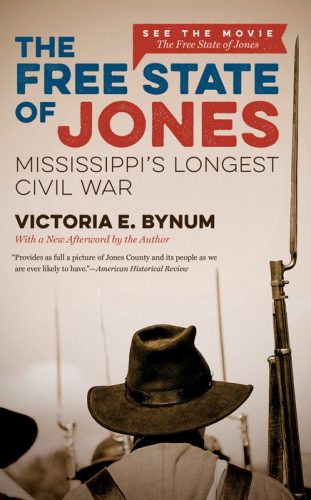
First, Free State of Jones is based on actual events, which Victoria Bynum researched and wrote about in her 2001 book of the (almost) same name, a beautifully narrated history of Newton Knight and his interracial band of renegades, who rebelled against the Confederacy and fought for their rights during the Civil War and Reconstruction.
Second, the director Gary Ross has given every indication that historical accuracy (or at the very least, credibility), was extremely important in the making of the film. He consulted with no fewer than eleven historians, including Bynum, Margaret Storey (who has studied Unionists in Alabama), and Steve Hahn (whose book about black political struggles during this period won the Pulitzer Prize). He has created a website with links to documents and other sources. And he made a video debunking four Civil War myths (now showing on the Huffington Post website).
Third, we’ve been seeing some quality television shows (Roots, Underground, and Mercy Street) and films about slavery and the Civil War lately. 12 Years a Slave and Lincoln, in particular, showed that screenwriters and directors could tell vivid and important stories about the history of nineteenth-century America, and attract big audiences.
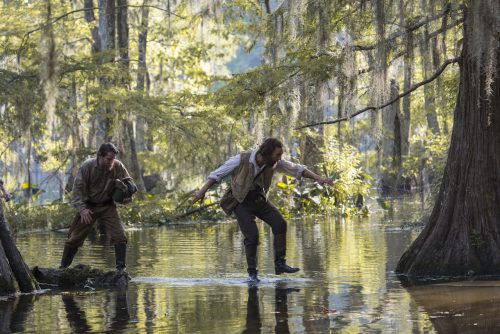
When the credits rolled at the end of Free State of Jones, I was happy. It is good. The depictions of warfare are realistic; the acting is compelling; many of the scenes, especially those filmed in the swamps of Louisiana (standing in for Mississippi) are hauntingly beautiful.
The last portion of the film, which tracks the members of the Knight Company during Reconstruction, is stilted. But it is one of the best filmic portrayals of both black political action and the racial violence that followed that I have ever seen.
There are problems, of course. It is a little slow in parts. Only Newt (Matthew McConaughey) and Moses Washington (Mahershala Ali; a fictional, composite character meant to represent the transition to freedom for southern slaves) are truly well-developed characters. The romantic plot – the evolving relationship between Newt and the slave then freedwoman Rachel (Gugu Mbatha-Raw) – feels flat and unconvincing. All of the other black characters are marginalized in the action; we do not even know their names. And I am not a fan of the black-and-white period photographs and expository text that appear every now and again. They interrupt the visual narrative and give the film a Ken Burns-y sort of feel.
But overall, I liked it. I looked around, wondering how everyone around me felt. But my fellow audience members at the 3:00 Sunday show bolted the theater before I could ask. I needed to talk to other people – non-academics, non-Civil War specialists – about Free State of Jones, to see if they agreed or disagreed with my assessment. And so I picked up the phone.
“Hello, Megan.”
My father, a man who stops at most historical markers on road trips.
“Halloooo!”
My mother, a cinephile who has seen more movies in her lifetime than you ever will. No, really.
“So what did you think?” I asked. They had gone to see Free State of Jones that afternoon, despite the fact that their local paper had given it a terrible review.
Mom: “It was great.”
Dad: “I thought it was a very good movie. Very interesting history, and a fascinating study.”
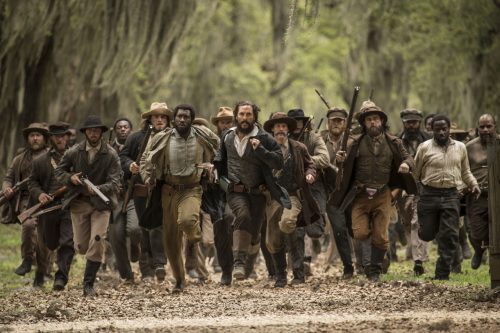
They agreed with me that the action was compelling. The marks of historical authenticity in the film – the bloody violence of the battle, the dirty fingernails, the dresses coming apart at the seams – made them feel like they were really there, which they enjoyed.
And while the graphic scenes of death and wounding were hard to watch, they thought such scenes were necessary. “War is just a video game to people now, that’s all it means,” my mother said. They thought that we must see the Civil War’s grim realities more often on screen in order to see its costs (you can see that I come by my dark history tendencies naturally).
The slower pace didn’t bother my parents. They thought that it was necessary to convey all of the complicated backstories, and that it contributed to the realism. They liked seeing both black and white women take part in resistance against the Confederacy. This, too, seemed authentic to them.
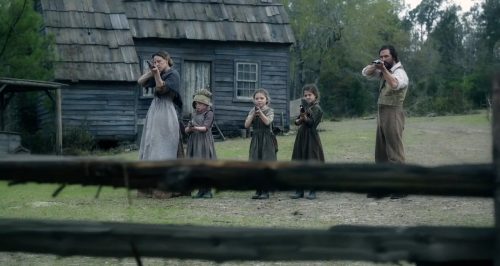
Several elements of Free State of Jones did surprise them (but in a good way): that Serena, Newt’s first wife (Keri Russell) would come back after the war to live with Rachel and Newt; that the Free State of Jones was so far south rather than closer to the border states; and that such a community of renegades could form in the first place. “Where would Newt Knight have developed the willingness to work with slaves and say that they are real men?” my father asked. “That wasn’t real common in the South, was it?”
This points to a central argument of the film: that the “Solid South” was not solid, before, during, or after the war. Some of the Confederate deserters hiding out in the Jones County swamps were racists, and most of the Knight Company members were motivated by self-preservation rather than a sense of racial justice. But there were those who agreed with Newt that the Company’s rebellious actions “ain’t just for us. Black, white, rich, poor. It’s for everybody.”
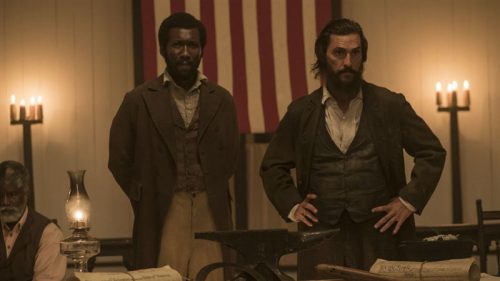
As Vikki Bynum noted in a Q&A with me for the SCWH blog, we need to understand the broad range of white southerners’ experiences during the Civil War in order to understand that conflict and what came after.
“In bringing the story of the Free State of Jones to the masses,” Bynum said, “not only is the image of a white Solid South negated, so also is the agency of Southern dissenters during the era of the Civil War and Reconstruction asserted.”
My parents had never heard of the Free State of Jones or its interracial community before Sunday afternoon. For that reason alone, my mother noted, the film is “a great accomplishment.” And it made all three of us think about the reverberations of the Civil War and Reconstruction today; we went on to talk about its connections to recent acts of racial violence and attempts to restrict voting, across the nation.
In the end, while I gave Free State of Jones 4 cannonballs out of 5 (for the reasons noted above), both of my parents gave it 5 out of 5.
Dad: “I found it very interesting, and a pretty compelling film.”
Mom: “I would actually buy it. And I don’t even like Matthew McConaughey that much.”
A print version of this review will appear in the fall 2016 issue of the “Civil War Monitor.”
Hi Megan. The comparison between Trump and Newt Knight, based on Knight’s media representation within the movie’s trailer, this blog, and Huffington Post’s critique of the film titled Free State of Jones Capsizes Lost Cause Myths, speaks to an audience sensitive to the media’s exploitation of archetypes that reinforce dominator politics along the axis of race, class and gender. Despite Knight’s notable feat of confronting racial and class hierarchies to create a more egalitarian community in Mississippi during and after the Civil War, the movie’s trailer traditionally situates Knight as a white male asserting power through violent ends to conquer land…period. His bravado is magnified through his sexual relations with a “mixed race slave” that caters to a mainstream audience’s familiarity with the Jezebel archetype casting black women as hypersexual magnets of white male desire. For a general audience who brings less academic heft to their viewing of the film, unlike your parents who are recognized as having developed an intellectual rigor in history and in cinematic studies, the familiar visual narrative of the white male hero whose authority is affirmed through brutality and sexual exploit does not stray far from the xenophobic, racist and sexist political postures of the Trump campaign. In fact, a film goer may justify Trump’s bigoted rhetoric as a corrective to Knight’s failed attempt at building an interracial democracy. Read in this light, the cinematic rendition of Knight’s story affirms rather than “capsizes” the aim of the “pernicious” Lost Cause.
While this perspective is not comforting, it certainly recognizes the work many viewers have to do to disentangle themselves from a media lens that predominantly supports narratives that promote white supremacist capitalist patriarchal values. The interpretation of the Free State of Jones, as anything else, depends on how willing you are to confront systems of oppression on all levels all the time. There is no doubt that Newt Knight’s story deserves a space in the historical documentation of the Civil War; however, I am questioning the director’s archetypal rendering of the characters located in the trailer that feed into racial archetypes and patriarchal violence commonly consumed through popular culture and meted out within institutions, homes, and on the streets with equal vigor.
I think you’re reading too much into a 90-second clip. It is, after all, a mainstream Hollywood movie, and Mathew McC is the box-office draw. What do you expect? But having seen the film, however, it definitely “capsizes” the Lost Cause mythology better than any other Civil War film I’ve seen. And I’ve seen a lot. Really, you should watch the film.
You’re reviewing a trailer or a film? Doesn’t sound like you actually saw the film. Might be an idea to see it before spending so many paragraphs attacking the film in your head and not the one on the screen.
Rhonda, I completely agree that popular media’s power to reinforce both hierarchies of power and archetypes is unparalleled in American culture, and so we have to recognize the potentially destructive work that they do. But I also see a recent shift in the way that popular media depicts white male protagonists in Civil War films (southern Unionists, politicians, deserters); these films are engaging with the Lost Cause mythology in multiple ways, and we need to consider all of them carefully. Free State of Jones – which I still urge you to see in its entirety – creates a different and more complicated vision of power structures than the trailer does. Hopefully, together with “Lincoln,” “12 Years a Slave,” and “Birth of a Nation,” “Free State of Jones” can work to create a broader vision of the past that can, as you say, confront systems of oppression that are still with us today, in many forms.
Hi Megan. Thanks for contextualizing the film within a shift towards presenting narratives counter to the romantic views of the Lost Cause. I will definitely keep this in mind when I get a chance to view the film and shape a response to it.
In the meantime, I continue to remain troubled by the continuum of patriarchal violence exercised by Knight’s group in the mid-1860s, the police officers who recently killed black men, and the culprits of the spate of police killings. America’s physical expressions of male domination (even if they are aped by women as presented in the trailer) is presented as a common solution to ideological conflicts that undermine economic freedom and agency. However, has this approach led to developing a unified society that politically, socially and economically supports equality? I know the responses to this question are lengthy and complex but, in a nutshell, I assert that the answer is “no.” I find it interesting that today’s viewers of Free State of Jones are navigating a tense relationship between themselves and the police compounded by the right to use open-carry or concealed guns amidst stereotypes linking black identity with criminality posing lethal consequences to both civilians and the police. The film, from this standpoint, may reinforce the perceived privilege of white men who assert violence that either goes unpunished or receives redemptive treatment by the media. It’s hard to separate the story of Free State of Jones from today’s freighted discussions of race, privilege, and power that condones patriarchal trauma.
What exactly do you mean by “the continuum of patriarchal violence exercised by Knight’s group in the mid-1860s”? I’m not following the connection you’re trying to make between Knight’s inter-racial band of Confederate deserters and runaway slaves (including women in both groups) and the recent/ongoing issues of police brutality.
Hi Megan. Thanks for the analysis of the film which left behind opportunities for further reflection. As an education, I can easily see students doing a comparative analysis that engages the film and either/and “Birth of a Nation” and “Nat Turner.”
While I may agree with the comments that support the film’s racial unification theme (admittedly, I have not seen the film), I do see the film as potentially a nod to framing white male leadership as best capable of steering the country onto its “right” course. Whether it’s Trump’s “Make America Great Again” or Ross’ “Free State Jones;” both men and cultural products are enacting white male agency (albeit, towards different seemingly different ends) that, from a black female perspective, still leaves privileged white males to leverage control over black bodies. As I view the movie in the near future, I’d be interested in looking at character development that may/may not resist expressions of dominator codes/values.
I’ll share a follow-up response once I view the film.
Rhonda
This has been the major critique of the film – the White Savior theme – and I can see the point (especially given the casting of McConaughey, who seems drawn to such roles) – but only to a point. Comparing Newton Knight with Donald Trump because of their shared white male privilege does not hold up. Knight’s leadership of his interracial band is much more complicated than the assertion of control over the bodies of others. Your qualification above (“towards seemingly different ends”) is the key here – their ends are very different, and historically contingent in ways that undermine this comparison. Definitely see the film. I think it may surprise you.
After reading your review I decided to get up from my writing desk yesterday and catch a matinee. While waiting for the film to start a trailer for Nate Parker’s *Birth of a Nation* came on, and an elderly white gentleman seated behind me declared, “I have absolutely no desire to see that movie,” and his wife seconded the sentiment. I wanted to ask them why *Free State* appealed to them, but a film about another group rising up violently against the enslaving class did not. But I did not. I think we know the answer, and that is that a lot of white people are still uncomfortable with films that have nonwhite heroes. I had read one pretty savage review of *Free State* accusing it of being just another white savior film, and the comments of the couple behind me seemed to confirm that. The film is all Matthew McConaghey and other characters remain partially developed. Nevertheless, I liked the film and think it did a lot of things right. I was especially pleased to see the film avoid a simplistic, feel good narrative where McConaghey’s white allies unshackle themselves from the racist worldview in which they were raised. Racism never disappears, and that makes the film’s Reconstruction narrative more understandable to the audience. There is a lot this movie does well, despite its limited development of anyone other than its principle character.
“Racism never disappears.” Exactly. Sadly. Hopefully, because the couple behind you saw “Free State of Jones,” it prepared them to think about “Birth of a Nation” differently.
As the Nat Turner story is endlessly depressing: religious fanatic murders a lot of white people (little kids and babies included), gets murdered himself, results in revenge murders of a lot of other black people, also results in even harsher repression against the enslaved…
Doesn’t sound like a crowd pleaser to me.
I loved Free State of Jones. A mournful movie but a story more than worth telling. In the South today, politicians exploit their Lost Cause version of history to keep today’s yeomanry in line, unfurling those Confederate flags. Though the audience that should see this movie probably won’t, perhaps a little of its brutal truth about the Civil War South will finally seep into their consciousness with the realization that the Confederate flag represents hate not heritage. Newt Knight represents the only heritage to be celebrated.
Mary,
If you happen to have Amazon Prime, you might watch the documentary *Nat Turner: A Troublesome Property.* It does a nice job of laying out the various versions of Nat Turner’s story in public memory over time, including addressing the disturbingly racist fictionalized account by William Styron, that suggests Nat was motivated by his lust for a young white girl. It also depicts the way African-Americans have interpreted the story over time as well. I think reducing Nat Turner to simply a religious fanatic (or John Brown for that matter) is problematic, even if it is part of what he was. The time is ripe for a fresh look at the Nat Turner story, so yes, I am looking forward to it, even knowing it doesn’t have a happy ending (neither does Free State). I won’t presume to guess whether the film is a success or failure based upon the movie posters and previews. It could be pathbreaking; it could be a grand disappointment.
Hi,
Thanks. I’ll check it out. As I said, the Nat Turner story seems so hopelessly depressing, I’m not inspired to see a movie about it. They killed people, they got killed and there were revenge killings of other slaves who weren’t even involved in the revolt.
I’m more than a little leery of the early reviews of the film as it debuted at Sundance in the midst of the #OscarsSoWhite controversy and reviewers were, understandably, anxious to throw their support behind a film made by a black director and screenwriter.
Unfortunately, since Sundance, the rape allegations against the director and the screenwriter (who was convicted) when they were college athletes at Penn State, have come to light, making the film a lot more controversial than it was before.
I don’t give Roman Polanski a pass, so I’d find it hard to give Nate Parker and Jean Celestin a pass for this one. But I’ll certainly check out the documentary.
The scene of the hogs rooting among the dead was worth the price of admission.
Spoken like a true environmental historian. #hogs